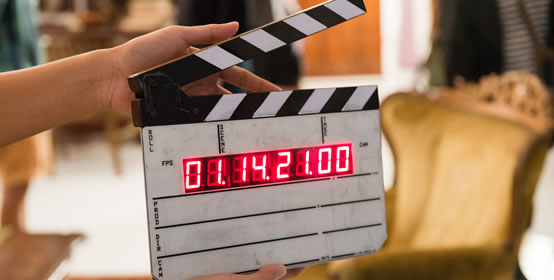
With the advent of the internet, computers, and the miniaturization of technology, the future of film may be a far cry from the bulky camera equipment and sound stages we know now.
The ability to film and upload video using a phone has already dramatically impacted film by allowing anyone to create their own independent projects without a lot of overhead or technical knowledge. Now, advancements and equipment specifically for phone-based filmmaking may democratize film even further by allowing phone users to get the same, high-production-value feel you'd normally only get with expensive camera equipment. If it's hard to imagine an entire, feature-length movie shot on a phone, don't worry—it's already happening. Just look at the Sundance hit Tangerine.
Creative editing and the careful application of technology have been used for post-mortem performances plenty of times before (just look at Tupac Shakur's appearance at Coachella in 2012, or Oliver Reed in Gladiator). That said, the ability to digitally re-create faces, bodies, and even dialogue is experiencing some dramatic improvements. Digital effects have progressed to the point where it is possible to create a stunningly lifelike facsimile of just about anyone. While this ability represents a tremendous technological advancement for film and stage performances, it does raise several moral and ethical dilemmas. Not all performers are comfortable with continuing to make appearances post-mortem, extras are concerned that the ability to digitally create people will cause them to lose work to cheaper digital puppets, and we may no longer be able to rely on the truth of video evidence.
While current 3D technology allows for a more immersive, exciting film experience, virtual reality is poised to be the wave of film's future. With new projects like Two Eyes VR, it's possible to create a finished product that utilizes full 360° recording to allow us to watch films the same way we see the natural world. Like any new advancement, however, the potential widespread adoption of VR does come with a downside—not every viewer can tolerate a virtual reality environment for the length of the average feature film, so more conventional cameras may not be going the way of the dodo just yet.
Before long, award-winning cinematography might be courtesy of an algorithm. Drones are already pretty great at capturing shots that are difficult, if not impossible, for a regular cameraman to get. Now, imagine the mobility of a drone combined with an algorithm that allows it to autonomously avoid obstacles and employ different filming techniques. Not only will drones be able to go where regular cameras can't, they'll know how to maintain the framing of aerial shots with little input needed from the ground.
Digital editing is one of the most tedious, if important, aspects of producing a polished, finished film. Right now, MIT researchers are developing ways to help automate and streamline the process. Facial recognition technology has already improved by leaps and bounds in just the past few years, but computers may soon be able to follow scripts, automatically label every clip, and apply jump cuts and other editing techniques to enhance the feel of a scene. While nobody wants video editing to take more time and effort, it does raise some interesting questions about the concept of art in filmmaking—can a film still be artfully made if computers are programmed to handle the technical parts?
Past advances like green screens, animation, and camera stabilization allowed filmmakers to bring their creations to life in ways that their forebears could only dream of. Now, modern advancements are largely geared toward streamlining the editing process and improving availability of filmmaking technology. No longer will would-be filmmakers need access to a studio and hundreds of thousands of dollars' worth of equipment to turn out a polished finished product, nor will they have to spend hours dealing with tedious editing.